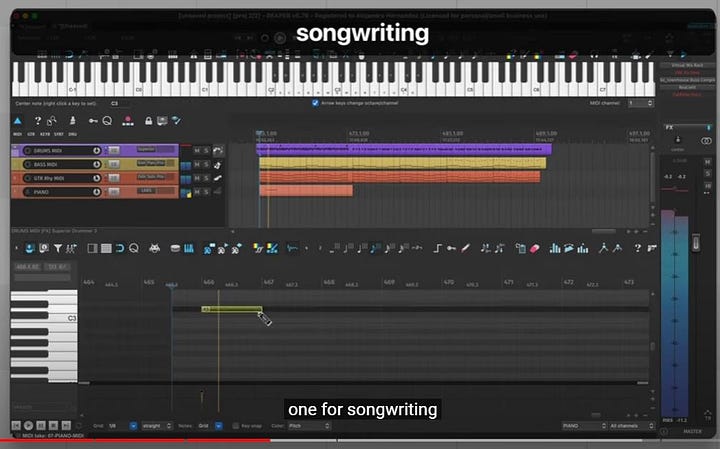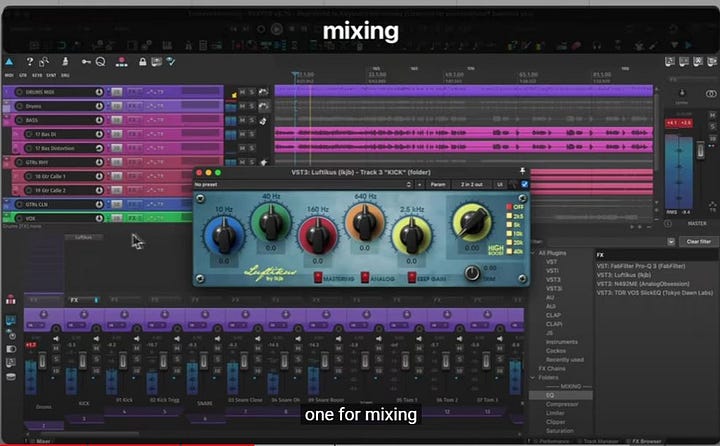Update: Scobiphonic Studios Production Status
Taking music to the next level with demo track overdubbing
Being a one-man band requires a certain skill set. And it’s very possible, especially with today’s digital software, to acquire these skills.
As a new songwriter, I thrive in writing and exploring melodies and chord progressions. But getting a song down on paper and then playing it out on a work tape is just half the job. The other half is singing and recording production.
For the past month, I’ve immersed myself in training courses to overcome these two main constraints.
The Muse and Musical Techniques
Songwriting is both art and skill. I am fortunate that I have an active muse to assist in song creation. I also know that my muse is a front end specialist. It has no interest in finishing song lyrics or recording a demo track full of accompanying instruments.
Musical techniques take over when a song hits the wall. Believe me, the muse is not offended by this approach; it’s work is already over. Rarely does a muse stick around to complete the task.
The same is true for production. Raw talent is more the former than the latter. For me, singing is by far the hardest element of making music. So recording techniques and tools help to fill the gap of mediocre vocals and limited musicianship.
There are two goals. One is to make my music more palatable. In raw form it is hard for the listener to capture a song’s essence. Raw formats allow an artist to reach a completion point. Not unlike a “minimum viable product” (MVP) distributed by Silicon Valley companies to get products to market early, then reformatting the bugs out later after feedback.
The second goal is to create a demo tape version. Demo tapes are a music industry standard. I harbor no illusions, but I do harbor dreams. If an original song of mine has a sliver of a chance to be published, then I need to put in the effort. That’s the first reason.
The second reason relates to a personal desire to create the song that plays in your head. Songwriting is tortuous. Your mind and soul drive rhythms and vocals with a full band beating out the best version. Then it’s up to your little home studio to try and recreate that sound.
In short, the muse is the catalyst, but the musical mix is a practical creation to serve both the audience and the artist.


The Mission and Remix Revival
This songwriting journey has turned into a mission.
When I started, a year or so ago, I was content to just write lyrics, create a melody and call it a song. After jumping into the SongTown and YouTube world to learn the craft, I’m ecstatic over the opportunity to pursue the music artform.
That means the learning curve just zoomed upwards. It will take some time to get into a groove in order to create a groove. Translating songs from my head to a set of computer tracks requires a lot of trial and error.
My plans are to start with one new song and one old song. For the old song, I want to reach back to my first recording: When Jeff Bezos Dies. That way we can both hear the original versus the remix difference.
Song output over the next few months may suffer a bit as I grapple with the mechanics of track building, mixing and MIDI instruments. But I am in this game for the long term.
My entire life is defined by exploration. This musical landscape is just the newest frontier.
Stay tuned.
[Photo Credit: Reapertips Youtube Channel]
===========================
If you like the songs and/or essays, please help me distribute them by sharing and following me on Twitter, Substack and Instagram.
I appreciate your time and support in this endeavor. Except in special cases, my original songs are free to the public. Please be mindful that alterations for racist intent is not permitted. Be critical, not hateful.




Nice work keep it going!